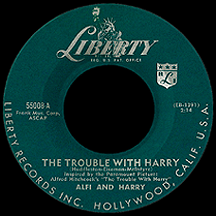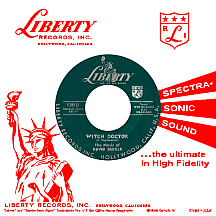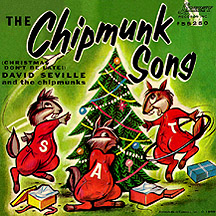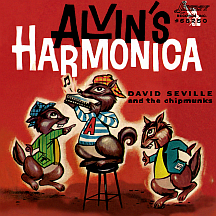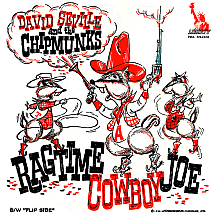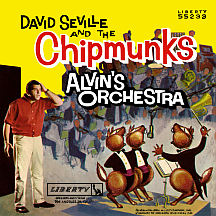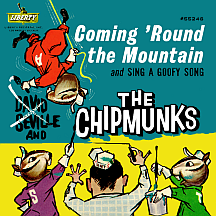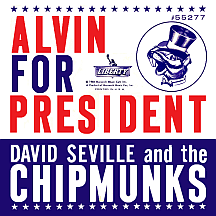DAVID SEVILLE
AND THE CHIPMUNKS
When Rostom Sipan Bagdasarian began his show business career in the late 1930s, it wasn't part of the plan to someday make it big in the children's record market. But after several of years of trying different things, his creation of The Chipmunks caught the imagination of millions of kids and a few adults, too. He'd always had a knack for writing clever novelty songs; some experimentation with magnetic tape led to the creation of a trio of pitch-adjusted cartoon rodent voices led by one obnoxious "child" in particular. The timing was perfect; his "Al-vinnn!!!" yell was a sound practically everyone became familiar with.
In 1919, nearly four decades before this national obsession took hold, Bagdasarian was born in Fresno, California of Armenian heritage. The vineyards were his streets; as a teenager during the '30s he worked in his father's grape-growing business. An outgoing child, he frequently acted in school plays and dreamed of making a career of it, so a year after graduating from high school he moved to New York and appeared, at age 20, in the Broadway production of The Time of Your Life, a play by his cousin William Saroyan, also a native of Fresno. The minor role of a newsboy gave Ross one spotlight moment: he sang "When Irish Eyes Are Smiling" during each performance. The production won a New York Drama Critics' Circle award for Best Play and a Pulitzer Prize for Drama, but didn't, unfortunately, lead to any further work for the young actor.
For years, Ross had been coming up with ideas for songs; on a long drive to Fresno he and Saroyan started playing around with a traditional Armenian melody and the lyrics of a song called "Come On-a My House." Career plans were put on hold shortly after the December 1941 bombing of Pearl Harbor; Ross enlisted in the Air Force, serving through the end of World War II, after which he returned to Fresno, resumed the grapevine gig and took a wife. But it was an unsatisfying existence for someone overflowing with creative ideas. His wife Armen suggested they move to Los Angeles, so they packed up, didn't forget to take their two children, and relocated a few hours south to Hollywood.
After more than a year of knocking on doors and singing his '...gonna give-a you candy' song, it became a featured number in an off-Broadway play, The Son. Saroyan and Bagdasarian recorded "Come On-a My House" for Coral Records in the spring of 1951 with Bill's semi-comedic narration and Ross's fast-paced singing: '...a marriage, ring an' a pomegranate too!' Mitch Miller of Columbia Records felt the song had hit potential and suggested it to Rosemary Clooney, whose recording, with several of the original's quirky aspects (including the narration) taken out, hit number one in July 1951, a first for her, and Bagdasarian...and Saroyan, for whom it was his only songwriting credit.
Once established, a wellspring of songs came from the pen of Bagdasarian, the next most popular likely being "Hey Brother Pour the Wine," which he did for the Mercury label in 1953; Dean Martin's early '54 cover (unlike Clooney, he made no major changes) became one of the singer/movie star's signature songs. Speaking of movies, Bagdasarian began auditioning for, and bagging, small parts in major films like The Greatest Show on Earth and Viva Zapata! before landing a more prominent supporting role in Destination Gobi, a war film directed by Robert Wise and starring Richard Widmark. He did a little singing as a POW in Billy Wilder's Stalag 17 and had a nonspeaking part as himself (well, as a songwriter, anyway) in Alfred Hitchcock's Rear Window. There were several other film and television appearances through 1958, the year Bagdasarian's good fortune placed him in control.
In early 1956 he had his first charting single, though few would have placed any significance on it. "The Trouble With Harry," an instrumental tune penned by Floyd Huddleston, Herb Wiseman and Mark McIntyre, was inspired by (but had nothing to do with) the Hitchcock film of the same title. The explanation was in the narration by Ross, paying homage to the film and his friend the director, with obvious artist credit going to Alfi and Harry (though Harry in the film was a corpse throughout, in the song he's a living piano-pounder playing an annoying-but-appealing, variable-speed-with-flat-notes melody). The success of the single, released on Liberty, prompted the fledgling label to offer the singer-songwriter a deal for more of the same...and he could use his own name if he liked! First off, he played it straight with a gradiose theme from "The Bold and the Brave," a compelling war-and-gambling movie featuring an Oscar-nominated performance by Mickey Rooney, who contributed to the song's lyrics and received writer credit. Then Ross reverted to the lighter-hearted approach with "Persian on Excursion," a second Alfi and Harry disc.
Ross decided to take a stage name, deciding on David Seville because he'd been stationed in Seville, Spain during World War II and had fond memories of the city. Henceforth, single releases were by The Music of David Seville with Bagdasarian still listed as the songwriter where applicable. The first was an instrumental named for his wife; "Armen's Theme" became a mid-sized chart hit in late '56, buying him more time at Liberty to keep trying things to see what might stick. A third Alfi and Harry release, "Safari," is a silly sonic painting of a jungle excursion circa 1950s (with sound effects) and was the final A&H release. Seville touched on dyslexic anxiety brought on by hurrying to see the object of one's desire ('She ain't home?'); the humorous "Gotta Get to Your House" made a brief showing on the charts in September 1957.
A tape-speed technique that had been used in obvious and subtle ways, most notably as the voices of outer space creatures in Buchanan and Goodman's series of "Flying Saucer" records, gave Ross the idea (while reading a just-released book, The Spiral Road by Dutch writer Jan de Hartog, which included a chapter titled Duel With a Witch Doctor) for the title character in his spring 1958 single "Witch Doctor," the high-pitched medicine man's voice making the song a duet of sorts, albeit a blatant novelty with the lyrics 'Ooo-eee-ooo-ah-ah-ting-tang-walla-walla-bing-bang!' (these nonsense words conjured from the thought of a relative who'd recently moved to Washington state). Suddenly and without warning practically everyone, particularly children, mimicked this phrase whenever the mood struck (often!). No one besides, perhaps, the staff at Liberty had any clue the real April Fool's joke would come a little later than the first of the month. The single debuted on the Billboard chart in mid-April and was Liberty Records' very first number one hit two weeks later.
More creators jumped on the speed-altering tape-trick bandwagon. Within days, country singer Sheb Wooley released "The Purple People Eater," an even wilder novelty that reached number one in June. Bagdasarian didn't waste any time getting a follow-up ready; "The Bird on My Head" altered the speed for a slightly-less-shrill "bird voice," as "Dave" and the winged creature perched on his skull griped about this '...wicked, wicked, cruel-cruel world,' trading lines and woefully singing in unison. Dave: 'We've been sittin' here so long...' Bird: '...that I forgot how to fly.' The single made a respectable top 40 showing. Seemingly done with the gimmick, the next disc was "Little Brass Band" ('...that plays inside my heart'), breaking down the components of an apparent miniature band. But what's this I hear? Speeded-up instruments? He's sticking with the same idea! The most spectacular variation was about to happen.
One day a chipmunk dashed in front of Bagdasarian's car, or so the story goes. He went into the studio and began working on the voices he would do for his next project. Slight modifications to the tape speed and some varying inflections in his voice resulted in three characters he named after Liberty Records executives Al (Alvin) Bennett, Sy (Simon) Waronker and studio engineer Ted (Theodore) Keep. With the holidays approaching, he wrote "The Chipmunk Song" (informal title: "Christmas Don't Be Late!"), giving the (adorable? not so fast!) rodents vocal duties, ruined by one particular "problem child" who kept insisting 'Me, I want a hula hoop!' Ross's reaction ("Al-vinnn!!!") would become a trademark. A December 13, 1958 performance on The Ed Sullivan Show with puppet Chipmunks was well-timed to put the song at number one for the last two weeks of December '58...and the first two weeks of January '59.
Suddenly the Seville alias was less a professional name than a character in his musical skits. "Alvin's Harmonica" (with the first-time billing of David Seville and the Chipmunks) refined the personalities of the buck-toothed trio just a bit; Alvin emerged as particulary rebellious, basically throwing tantrums until he was allowed to do a harmonica solo (or perhaps Dave was a little too sensitive). Fans ate it up; the song made it to number three in March. Bagdasarian came on strong at the May 4, 1959 (first-ever) Grammy awards with a Record of the Year nomination for "The Chipmunk Song" and "Witch Doctor" nominated in the Best Recording for Children category. He won twice that night, for Best Comedy Performance and Best Recording for Children (both for "Chipmunk Song") and Ted Keep won Best Engineered Recording, Novelty for "Alvin's Harmonica."
1959 continued briefly sans 'munks with a mostly-instrumental romantic interlude by David Seville titled "Judy" that reached the charts in April. Recordings of this type (various novelties and many instrumentals with titles like "Almost Good," "Mediocre" and "Flip Side") offered respite, for adults perhaps, from what may have felt like a nonstop barrage of immature material. A top 20 summertime Chipmunks single was a remake of "Ragtime Cowboy Joe," a 1912 country classic written by Lewis Muir, Maurice Abrahams and Grant Clarke. The appearance of the Chipmunks at that time was closer to a furry rodent look but evolved as time went by. Songs got bigger and bolder in 1960, such as "Alvin's Orchestra," concerning a 50-piece band Alvin hired without Dave's approval, and a bid for the highest office in the land with a late summer "Alvin For President" campaign. The lucrative holiday theme was revisited with the famous J.D. Marks tune "Rudolph the Red Nosed Reindeer," with Rudolph himself dropping by to sing along with his pal Alvin and the "fellas."
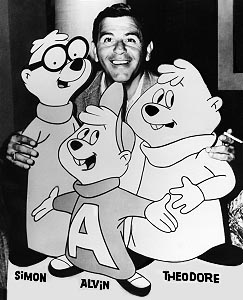
When Grammy time rolled around in '61, the award for Best Album Created for Children went to Let's All Sing With the Chipmunks. Alvin, Simon and Theodore had become favorites of preadolescents, ranking on a level with Disney's Mickey Mouse and Donald Duck and Warner's Bugs Bunny (who'd landed his own ABC-TV series a year earlier, with new segments framing the classic Looney Tunes and Merrie Melodies of the '30s through '50s). A deal was struck with the CBS television network and in October The Alvin Show premiered in prime time with a simplified, more cartoonish-looking trio of Chipmunks. The series ran for one season, then was repeated on Saturday mornings for two years between 1962 and 1964. The Chipmunks latched onto the hottest dance craze in '62, scoring another top 40 hit with "The Alvin Twist," featuring a solo performance from Alvin with a band that sounded a lot like Chubby Checker's Philadelphia-based studio group.
Bagadasarian went back to his real name (though he'd always used it for songwriting credits) on the singles that were released between Chipmunks records, which dropped David Seville from the billing at about the same time. "Eefin' Alvin" (a takeoff on Joe Perkins' 1963 hit "Little Eefin Annie") reached a new low in intelligent (or even intelligible) entertainment. Getting on board with the hottest trend of 1964, he affected a fake British accent and made "Yeah, Yeah" as The Bedbugs. Its failure didn't stop him from trying again a few months later with the album The Chipmunks Sing the Beatles Hits (with all three, plus Dave, wearing mop-top wigs on the cover) and its single, "All My Loving," a more-or-less straightforward (if high, shrill vocals fit that definition) collection of Fab Four covers.
The Mary Poppins tongue-twister "Supercalifragi-listicexpialidocious" received a '...quite atrocious' Chipmunks revision that was nominated for a '65 Grammy (Best Recording for Children), capping their NARAS scorecard at nine nominations, four wins. In 1967, a 45 appeared on Dot Records (by The Chipmunks with David Seville), "Sorry About That, Herb," apologizing up front to Herb Alpert for their Tijuana Brass-style vocalese singing. The following year they were back on Liberty, joining blues-rocking labelmates Canned Heat for a "Christmas Boogie" jam misleadingly identified on the label as "The Chipmunk Song." Then the lovable trio seemingly disappeared.
Ross decided to go it alone with a mixed bag of solo and choral vocal efforts, instrumentals and novelty tunes released on Liberty over the next few years. In January 1972, he died suddenly of a heart attack at the age of 52. His incredibly popular singing cartoon characters had been dormant about 12 years when, in 1980, his son, Ross Bagdasarian, Jr., heard a disc jockey playing a random song at a faster speed, jokingly identifying it as "the new Chipmunks record." Realizing there might still be a market for the antics of Alvin, Simon and Theodore, he revived the act with an album, Chipmunk Punk, followed by Urban Chipmunk and a series of singles including some new Christmas offerings. With his wife, actress Janis Karman, Ross Jr. built The Chipmunks into a multi-million dollar franchise with merchandise, TV shows and movies (featuring singing female counterparts the Chipettes). Meanwhile, "The Chipmunk Song" continues to rank high among Christmas season hits. If by chance you should happen to walk past a house somewhere in California and hear people singing 'Ooo-eee-ooo-ah-ah-ting-tang-walla-walla-bing-bang'...you might be hearing the sound of joy in the Bagdasarian household!
NOTABLE SINGLES:
- Come On-a My House - 1951
by William Saroyan and Ross Bagdasarian - Hey Brother Pour the Wine - 1953
by Ross Bagdasarian / - Let's Have a Merry, Merry Christmas - 1953
by Ross Bagdasarian - The Trouble With Harry - 1956
as Alfi and Harry - The Bold and the Brave - 1956
by Ross Bagdasarian - Persian on Excursion - 1956
as Alfi and Harry - Armen's Theme - 1956
as the Music of David Seville - Gotta Get to Your House - 1957
as the Music of David Seville - Cecilia - 1957
as the Music of David Seville - Witch Doctor - 1958
as the Music of David Seville - The Bird on My Head - 1958
as the Music of David Seville - Little Brass Band - 1958
as the Music of David Seville - The Chipmunk Song - 1958
as the Chipmunks - Alvin's Harmonica - 1959
- Judy - 1959
as David Seville - Ragtime Cowboy Joe - 1959
- Alvin's Orchestra - 1960
- Coming 'Round the Mountain - 1960
- Alvin For President - 1960
- Rudolph the Red Nosed Reindeer - 1960
- The Alvin Twist - 1962
as the Chipmunks - Eefin' Alvin - 1963
as the Chipmunks - Yeah, Yeah - 1964
as the Bedbugs - All My Loving - 1964
as the Chipmunks - Supercalifragi-listicexpialidocious - 1965
as the Chipmunks with David Seville - The Song of Bruce and Dutch - 1965
as Bruce and Dutch - Sorry About That, Herb - 1967
as the Chipmunks with David Seville - The Chipmunk Song - 1968
by Canned Heat and the Chipmunks - Jone - Cone - Phone - 1969
by Ross Bagdasarian - You've Got Me on a Merry-Go-Round - 1969
by Ross Bagdasarian - I Treasure Thee - 1970
by Ross Bagdasarian


